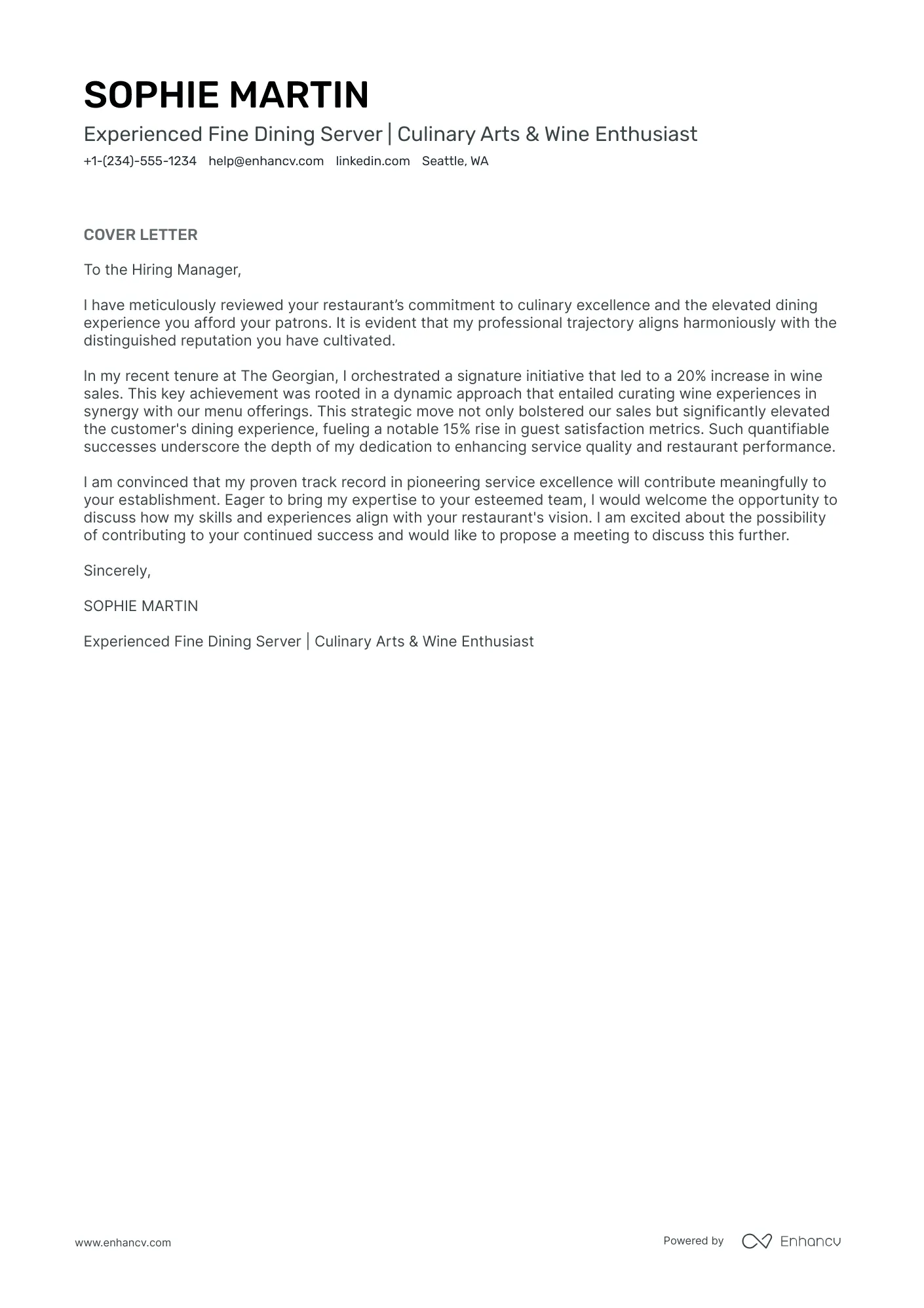Crafting a Server Cover Letter
A well-crafted server cover letter is your initial handshake with a potential employer in the competitive world of hospitality. It’s an opportunity to showcase your skills, experience, and personality, setting you apart from other applicants vying for the same position. A compelling cover letter complements your resume, providing a narrative that highlights your suitability for the role and demonstrates your genuine interest in the restaurant and its values. Taking the time to write a perfect cover letter can significantly increase your chances of landing an interview and ultimately securing the job.
Understanding the Purpose of a Server Cover Letter
The primary purpose of a server cover letter is to introduce yourself, express your interest in a specific server position, and persuade the hiring manager to read your resume. It allows you to elaborate on your qualifications beyond the basic information provided in your resume, allowing you to express your passion for hospitality and your understanding of the restaurant’s needs. Cover letters also give you the chance to demonstrate your communication skills, attention to detail, and personality. It shows that you’ve taken the initiative to go the extra mile, suggesting that you’re truly interested in working at their establishment.
Highlighting Relevant Server Skills
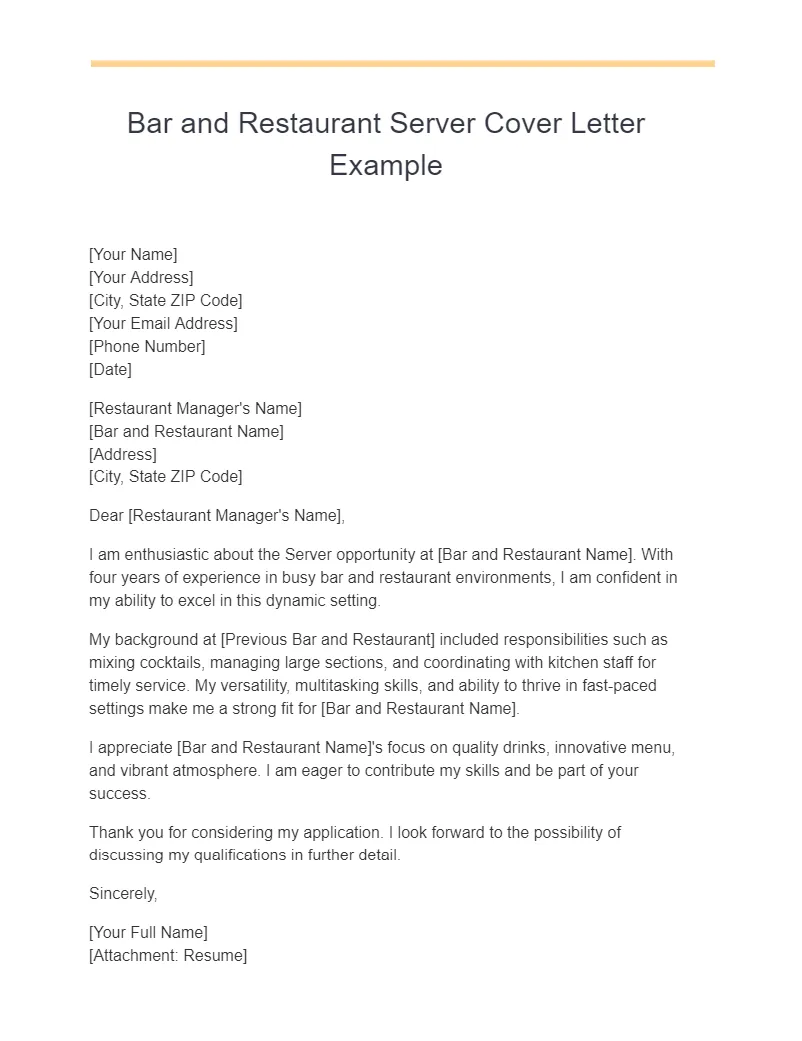
Server positions demand a diverse range of skills. Your cover letter should spotlight your most relevant skills and experiences. These skills are not only technical but also interpersonal. Highlight your proficiency in key areas, making sure that you show them that you are the best candidate. Use examples to prove that you can provide exceptional service and improve their customers experience. It is important to match skills with job descriptions to show the hiring manager you are a great fit for the role.
Customer Service Skills
Customer service is at the heart of any server’s role. Emphasize your ability to handle customer inquiries, resolve complaints, and ensure a positive dining experience. Mention any specific training or certifications in customer service you possess. Provide examples of how you’ve gone above and beyond to meet customer needs and create memorable experiences. Explain what makes you a good customer service representative.
Communication Skills
Excellent communication is vital for a server. Highlight your ability to communicate clearly and effectively with customers, colleagues, and management. Describe situations where you’ve successfully conveyed information, resolved misunderstandings, or taken orders accurately. Showcase your active listening skills and ability to adapt your communication style to different audiences. Show how well you can communicate clearly.
Teamwork and Collaboration
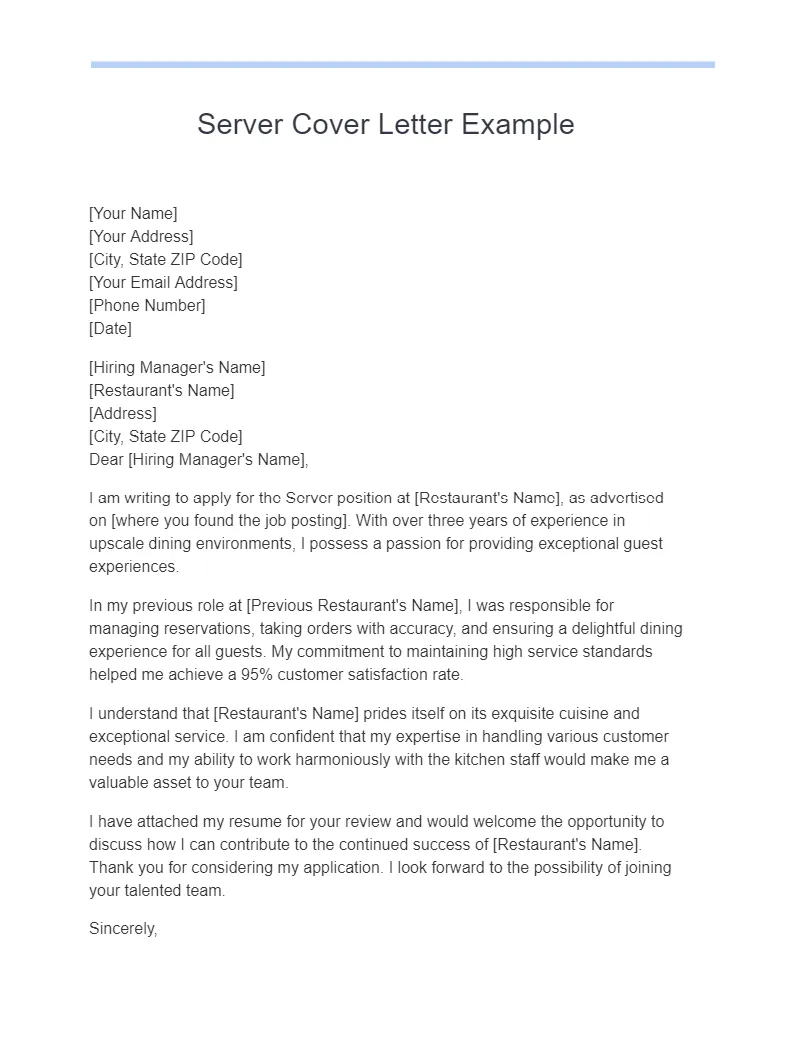
Servers work as part of a team. Illustrate your ability to collaborate with other servers, bussers, kitchen staff, and managers to provide efficient and seamless service. Give examples of how you’ve contributed to a positive team environment and helped achieve common goals. Share how you are able to collaborate with everyone and improve customer service. Show how well you work with others.
Detail-Oriented and Organizational Skills
Servers must be highly organized and pay close attention to detail. Highlight your ability to take accurate orders, manage multiple tables, and handle payments efficiently. Mention any systems or tools you’re familiar with using. Provide examples of how you’ve maintained order and accuracy in high-pressure situations. Show that you can keep track of everything, and that you are well organized.
Tailoring Your Cover Letter to the Restaurant
Generic cover letters are easily spotted and often discarded. Tailoring your letter to the specific restaurant demonstrates that you’ve done your research and are genuinely interested in the position. This personalization shows the hiring manager that you are invested in the establishment, its values, and its specific needs. The more you personalize the cover letter, the better.
Researching the Restaurant and Its Culture
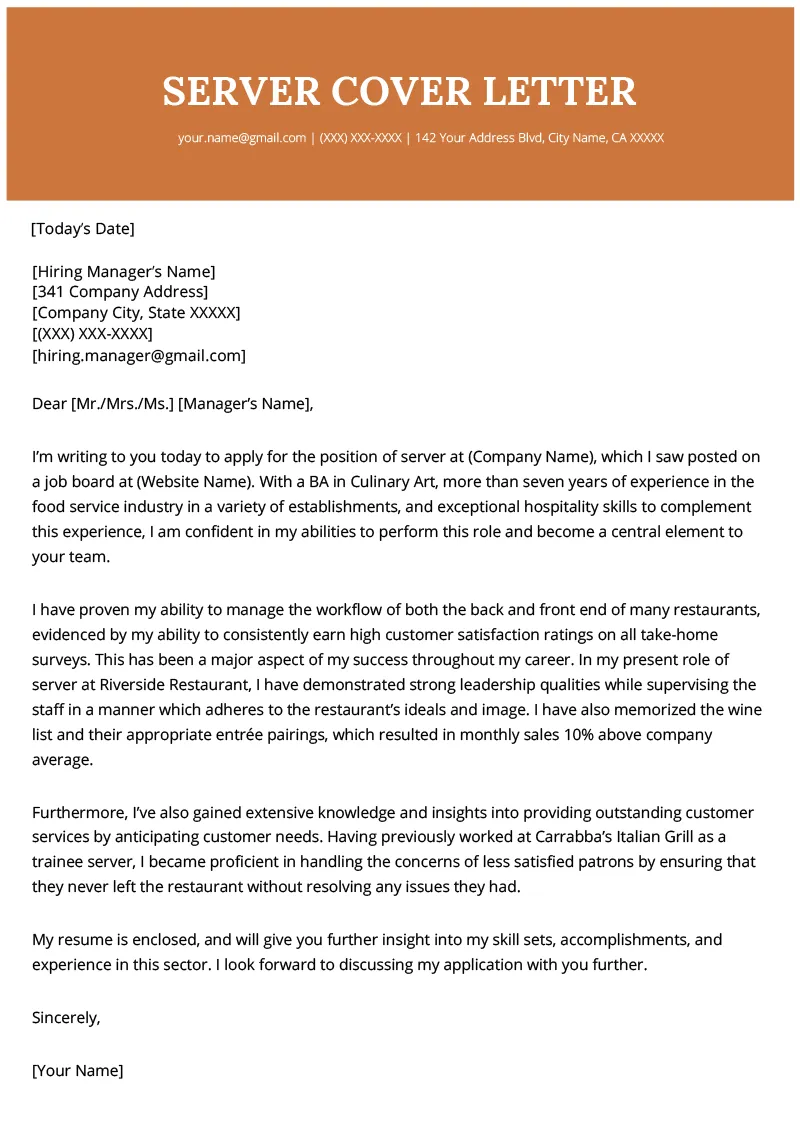
Before writing your cover letter, thoroughly research the restaurant. Visit their website, social media pages, and read online reviews to understand their menu, ambiance, and customer service style. Identify the restaurant’s values, mission statement, and any specific aspects that appeal to you. Use this information to demonstrate your knowledge and understanding of the restaurant in your cover letter. Show them that you care about their restaurant.
Personalizing Your Cover Letter
Incorporate the information you gathered about the restaurant into your cover letter. Mention specific dishes on their menu that you find appealing, comment on their ambiance, or reference their commitment to customer service. Demonstrate how your skills and experience align with the restaurant’s specific needs and values. Show the restaurant that you are the best person for the job.
Structuring Your Server Cover Letter
A well-structured cover letter is easy to read and understand. Using a standard business letter format ensures a professional presentation. A clear structure helps the hiring manager quickly grasp your key qualifications and assess your suitability for the role. The overall structure is very important.
Formatting Your Server Cover Letter
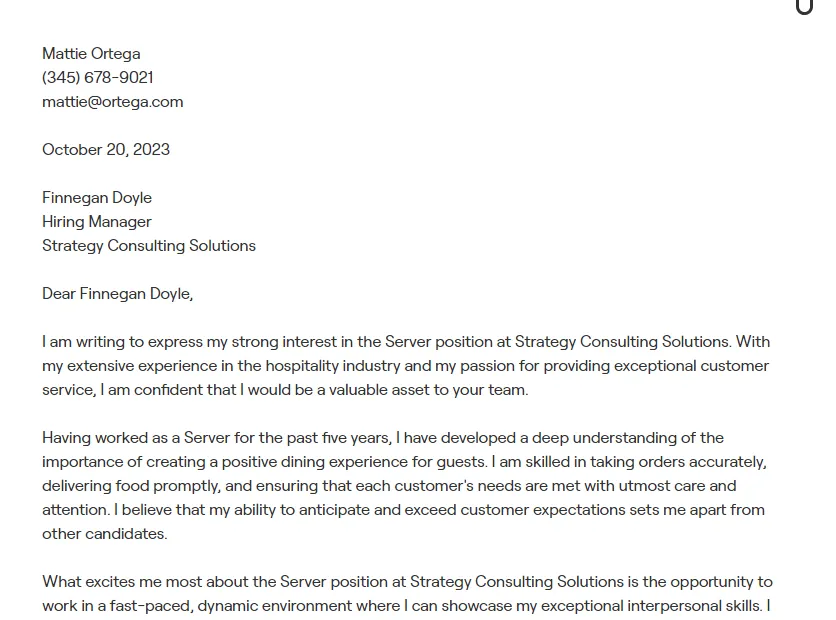
Use a professional font like Times New Roman, Arial, or Calibri, with a font size of 10-12 points. Use standard margins of 1 inch on all sides. Keep the letter concise, ideally within one page. Include your contact information at the top of the letter. Ensure the letter is easy to read, and that there are not many mistakes.
Writing an Engaging Opening
Your opening paragraph should immediately grab the reader’s attention. State the position you’re applying for and where you saw the job posting. Briefly introduce yourself and express your enthusiasm for the opportunity. Mention a specific reason why you’re interested in the restaurant. Make sure you have an exciting opening that will grab the reader’s attention.
Showcasing Your Skills and Experience
In the body of your cover letter, elaborate on your key skills and experiences. Use the STAR method (Situation, Task, Action, Result) to provide specific examples of your accomplishments. Quantify your achievements whenever possible, such as the number of customers served or the percentage increase in tips. Tailor your examples to match the requirements listed in the job description. Provide specific examples that are relevant to the job.
Quantifying Your Achievements
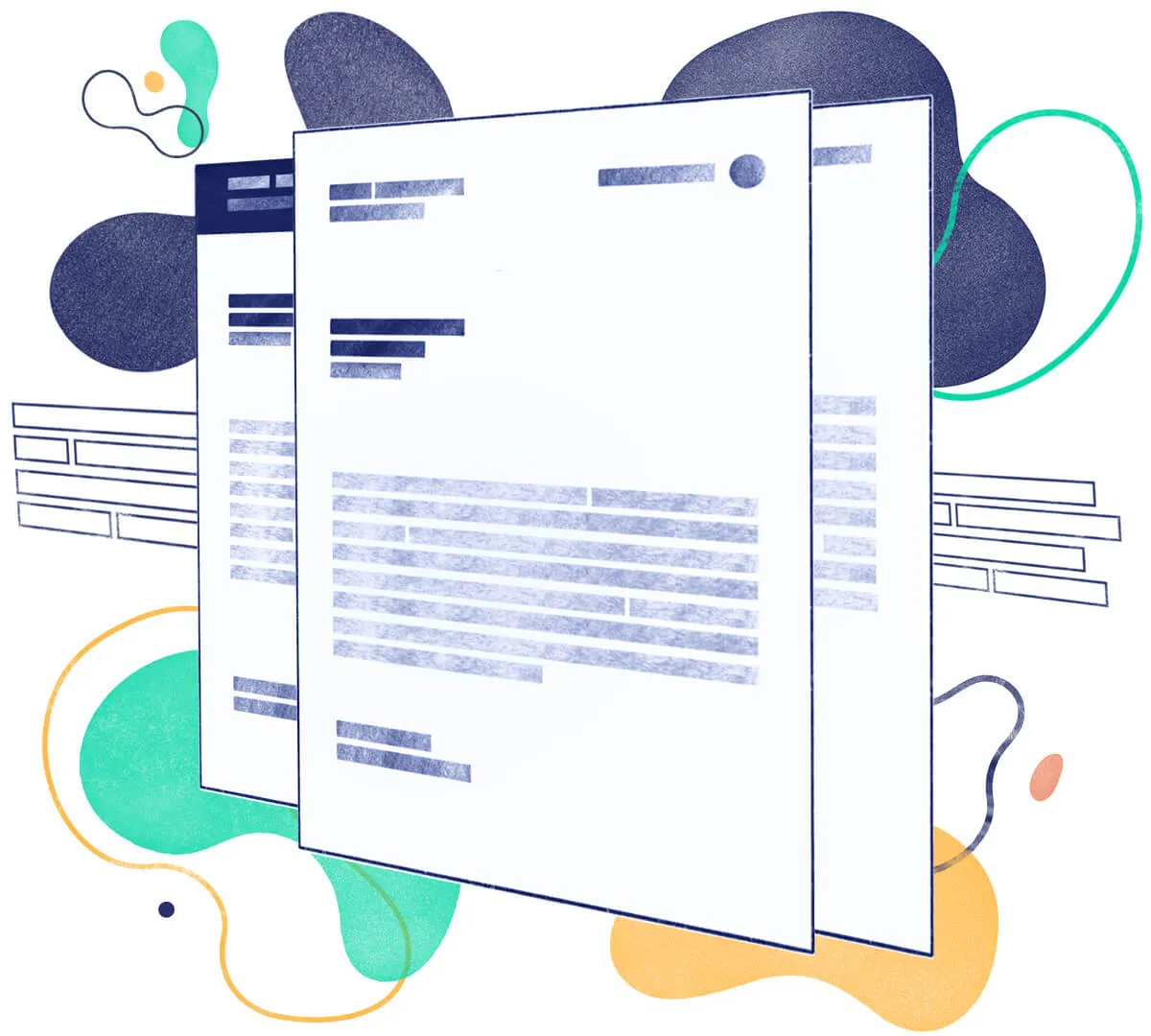
Use numbers and data to demonstrate the impact of your skills and experience. Instead of saying you provided excellent customer service, mention the percentage of repeat customers or positive reviews you received. If you increased table turnover, specify the percentage or the time reduction achieved. Quantifiable results make your claims more credible and memorable. The more numbers and data you include, the better.
Demonstrating Your Passion for Hospitality
Express your genuine passion for the hospitality industry. Share what motivates you to serve others and create positive dining experiences. Mention any specific aspects of the restaurant that excite you, such as its cuisine, ambiance, or commitment to customer satisfaction. Let your enthusiasm shine through. Show them that you want to work there.
Concluding Your Cover Letter
In your concluding paragraph, restate your interest in the position and express your eagerness to learn more. Thank the hiring manager for their time and consideration. Include a call to action, such as stating that you look forward to hearing from them soon or that you’re available for an interview at their earliest convenience. End the cover letter on a positive note.
Proofreading and Editing Your Cover Letter
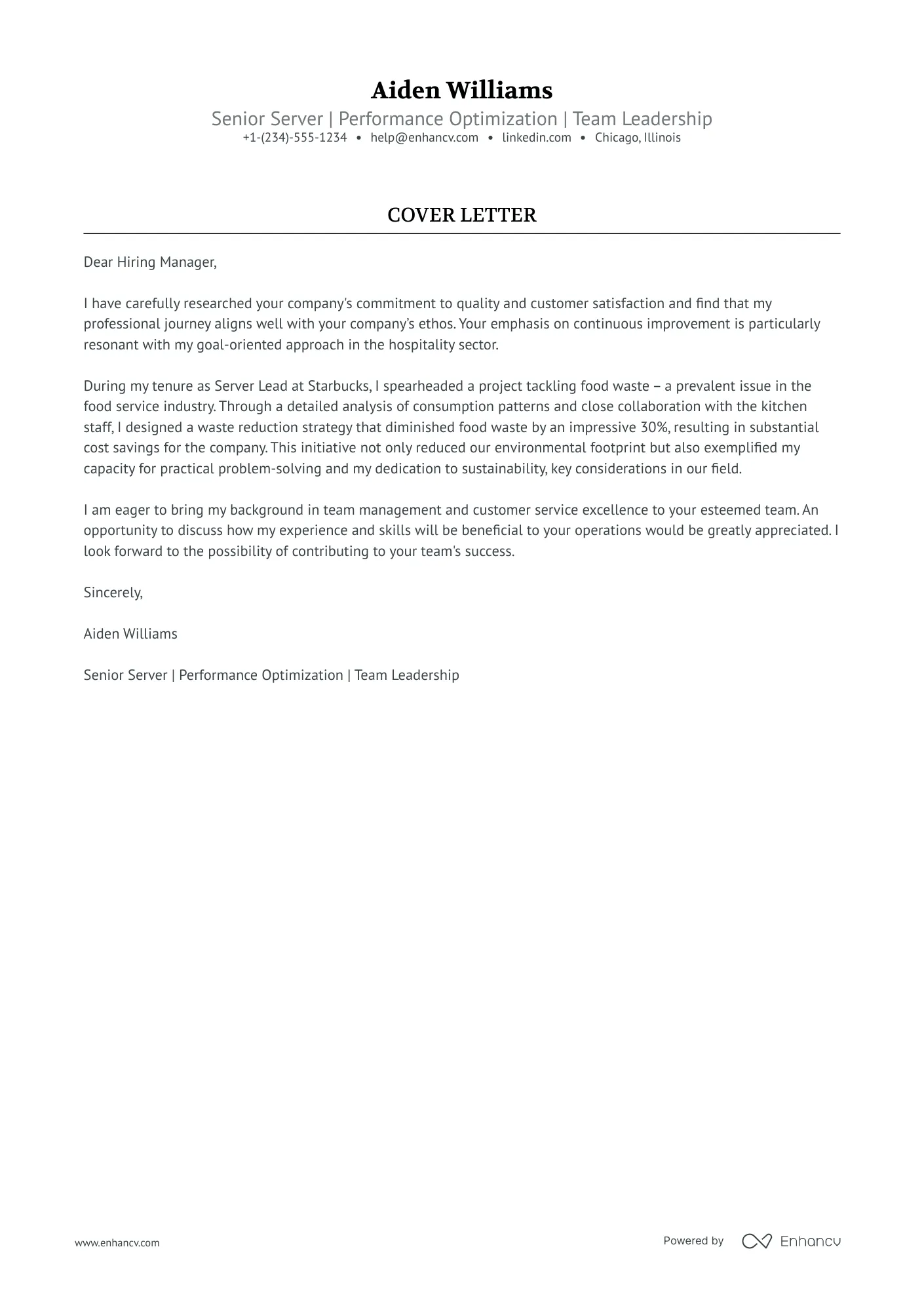
Before submitting your cover letter, meticulously proofread and edit it. Typos, grammatical errors, and inconsistencies can undermine your credibility. Read the letter aloud to catch any awkward phrasing or sentence structure issues. Have a friend or family member review your letter to provide an objective perspective. Make sure you take your time, and reread the cover letter multiple times.
Common Mistakes to Avoid
Certain mistakes can significantly reduce the effectiveness of your server cover letter. Understanding and avoiding these common pitfalls can greatly increase your chances of success. Make sure you do not commit these mistakes, in order to increase your chances of getting the job.
Generic and Vague Language
Avoid using generic phrases that could apply to any job. Instead of saying you have excellent customer service skills, provide specific examples of how you’ve demonstrated those skills in the past. Use action verbs and quantify your achievements to make your claims more compelling and specific. It is important that you do not use generic language.
Typos and Grammatical Errors
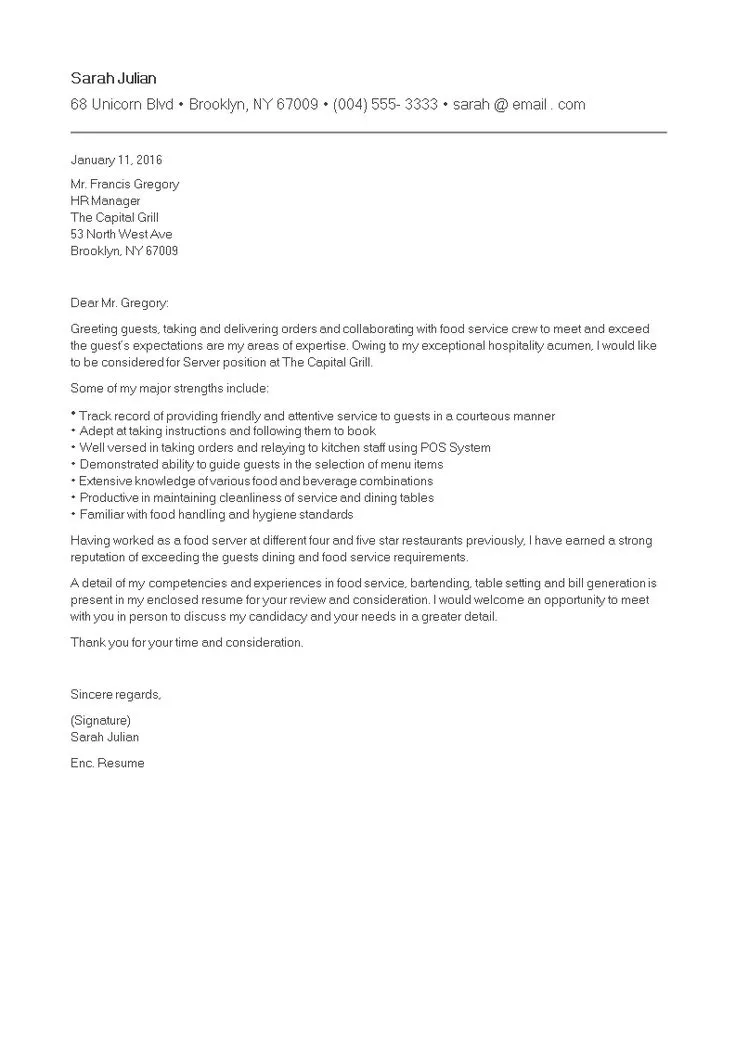
Typos and grammatical errors create a negative impression and can make you appear careless or unprofessional. Always proofread your cover letter multiple times. Use a grammar checker to identify any errors you might have missed. A polished cover letter demonstrates your attention to detail and your commitment to quality. Always ensure your cover letter is free of errors.
Ignoring the Restaurant’s Needs
Your cover letter should address the specific needs of the restaurant. Avoid using a generic cover letter template that doesn’t take into account the restaurant’s specific requirements. Tailor your letter to show how your skills and experience align with the restaurant’s values and goals. This shows you are a good fit for the role.
Reviewing Server Cover Letter Examples
Reviewing server cover letter examples can provide valuable insights and inspiration. Analyzing successful cover letters can help you understand how to structure your letter, highlight your skills, and effectively communicate your qualifications. This helps you to tailor your own cover letter.
Analyzing Successful Cover Letters
When reviewing server cover letter examples, pay attention to how the applicant introduces themselves, highlights their skills, and expresses their interest in the position. Note how they tailor the letter to the specific restaurant and quantify their achievements. Identify the elements that make the cover letter compelling and persuasive. Make sure that you take notes while reading the examples.
Adapting Examples to Your Situation
Use the examples as a guide to craft your own cover letter. Adapt the language, structure, and content to match your unique skills, experience, and the requirements of the job. Customize the examples to reflect your personality and your genuine interest in the restaurant. Make sure that you adapt the examples to your own needs.
